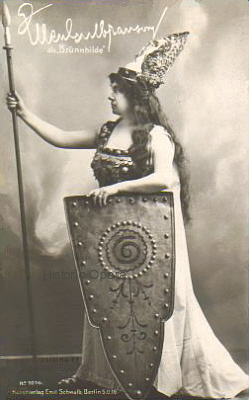Ellen Gulbranson (1863-1947) at the Bayreuth Festival

Swedish-born soprano who later received Norwegian citizenship. One of the great profiles of the second generation Wagner singers.
Ellen Gulbranson (1863-1947) at the Bayreuth Festival
1896
Die Walküre (Brünnhilde)
Siegfried (Brünnhilde)
Götterdämmerung (Brünnhilde)
1897
Die Walküre (Brünnhilde)
Siegfried (Brünnhilde)
Götterdämmerung (Brünnhilde)
1899
Die Walküre (Brünnhilde)
Siegfried (Brünnhilde)
Götterdämmerung (Brünnhilde)
Parsifal (Kundry)
1901
Die Walküre (Brünnhilde)
Siegfried (Brünnhilde)
Götterdämmerung (Brünnhilde)
Parsifal (Kundry)
1902
Die Walküre (Brünnhilde)
Siegfried (Brünnhilde)
Götterdämmerung (Brünnhilde)
Parsifal (Kundry)
1904
Die Walküre (Brünnhilde)
Siegfried (Brünnhilde)
Götterdämmerung (Brünnhilde)
Parsifal (Kundry)
1906
Die Walküre (Brünnhilde)
Siegfried (Brünnhilde)
Götterdämmerung (Brünnhilde)
Parsifal (Kundry)
1908
Die Walküre (Brünnhilde)
Siegfried (Brünnhilde)
Götterdämmerung (Brünnhilde)
1909
Die Walküre (Brünnhilde)
Siegfried (Brünnhilde)
Götterdämmerung (Brünnhilde)
1911
Die Walküre (Brünnhilde)
Siegfried (Brünnhilde)
Götterdämmerung (Brünnhilde)
1912
Die Walküre (Brünnhilde)
Siegfried (Brünnhilde)
Götterdämmerung (Brünnhilde)
1914
Die Walküre (Brünnhilde)
Siegfried (Brünnhilde)
Götterdämmerung (Brünnhilde)
1924
Götterdämmerung (Brünnhilde)
Gulbranson has vastly improved her impersonation of Brünnhilde since last year. She is still unmistakably a student, but no one can doubt that she will develop into a really grand artist if she avoids ruining her fine voice by continually using it in a wrong way. Her Brünnhilde is just now very beautiful and intensely pathetic, but it owes less to her art than her personality. She does not interpret Brünnhilde—rather she uses the part as a vehicle for her private emotions; to an inordinate degree she reads into it her real or imaginary experience; and she has not learnt the trick of turning her feelings into the proper channels provided, so to say, by the part—of so directing them that Gulbranson disappears behind Brünnhilde. Still, it is a great thing to find an artist of such force and passion and at the same time such rare delicacy; and I expect to come here in 1899 and hear an almost perfect rendering of Brünnhilde.
John F. Runciman in "Old Scores and New Readings"
There is yet one word to be said of Frau Gulbranson, the fourth pupil of the Bayreuth School of Singing. She sang much better than the other two. Her voice is fine and full of feeling, and her acting and appearance were child-like and maidenly in character, and, as was often and truly remarked, there was nothing of the prima donna about her; on the other hand, she was, lacking in grandeur and dramatic power. Her awakening in Siegfried was insignificant, and her acting in the second and third acts of Götterdämmerung was obviously studied, more particularly in the scene where, with her hand on the point of the spear, she calls down death on Siegfried’s head. Here her strength failed her completely. It is impossible to say how far Frau Gulbranson’s natural gifts and how far the Bayreuth School are answerable for this, and it is equally impossible to surmise how she would act and sing away from Bayreuth, when less under the influence of that place. But it will always be a preposterous and absurd idea to attempt to replace talent and individuality by school training. Wagner once said, “We must quicken our power of discerning genius so as to recognize it at once whenever it appears.” How far is Bayreuth nowadays from following this advice? Those who have seen Frau Materna, Frau Sucher, and Frau Reicher-Kinderman, can have some idea of what Wagner imagined Brünnhilde to be. The Mannheim Court Theatre once possessed a Brünnhilde in Cäcilie Mohor, who was unfortunately lost to the stage far too early through her marriage, and she far surpassed frau Gulbranson. In comparison to the others, it was difficult to follow what she sang, even if tolerably familiar with the poem. She is a Swede, and is still at draggers drawn with the German language. She is less to be blamed for this, than it is to be wondered at more, among the relatively few Germans present seemed to have even noticed it. Nowhere have I had this remarkable shortcoming mentioned, much less blamed. (Felix Weingartner in Bayreuth 1876-1896)
Selected Biographies



